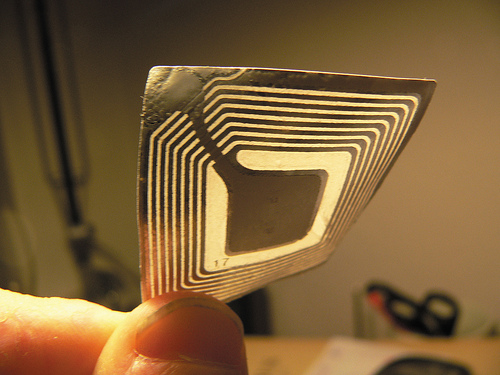Should I be Concerned About My Privacy from RFID?
Yes, You Should be Concerned About Your Privacy from RFID Devices!
As more and more forms of personal identity and credit cards become enabled with radio frequency identification chips, it’s becoming easier to not only access our own data but also to have that data stolen by data thieves.
It may be extremely convenient to simply swipe or wave a card to do your business. But how do you feel about someone being able to get all your information just as quickly and quietly, without you ever knowing about it?
Imagine the situation where someone can simply walk past you and within a few seconds have copied all the information stored on your personal identity cards, passport, bank cards and credit cards? How would you feel about a total stranger (or the government) being able to follow you down the street and see where you go and what you do all day? Just Like Big Brother!
Those are the darker and less convenient concepts that arise from the application of RFID to everyday consumer items. On the positive side, it makes for ease of transactions and enables a lot of information to be stored in the smallest of spaces. On the negative side, it’s broadcasting that information out to anyone who has the means to read it. Good or bad!
RFID Controversy
The use of RFID has engendered considerable controversy and even product boycotts by consumer privacy advocates
The two main privacy concerns regarding RFID are:
• Since the owner of an item will not necessarily be aware of the presence of an RFID tag and the tag can be read at a distance without the knowledge of the individual, it becomes possible to gather sensitive data about an individual without consent.
• If a tagged item is paid for by credit card or in conjunction with use of a loyalty card, then it would be possible to indirectly deduce the identity of the purchaser by reading the globally unique ID of that item (contained in the RFID tag). This is only true if the person doing the watching also had access to the loyalty card data and the credit card data, and the person with the equipment knows where you are going to be.
Most concerns revolve around the fact that RFID tags (microchips) affixed to products remain functional even after the products have been purchased and taken home and thus can be used for surveillance and other purposes unrelated to their supply chain inventory functions.
The concerns may be addressed in part by use of the ‘Clipped Tag’. The Clipped Tag is an RFID tag designed to increase consumer privacy. After the point of sale, a consumer may tear off a portion of the tag. This would be beneficial for consumer goods like clothing, household goods, etc…but does not provide protection for the credit or debit card used to purchase the goods.
However, the ‘Clipped Tag, does allow the transformation of a long-range tag into a proximity tag that still may be read, but only at short range – less than a few inches. The modification of the tag may be confirmed visually. The tag may still be used later for returns, recalls, or recycling.
Protect your RFID data devices from data theft. We recommend this product.
Upcoming Article:
Look out for our next article in this series – “What Can You Do About Radio Frequency Tracking?” You will find it informative and fascinating reading. Click HERE to read this article.
If you’re concerned about protecting your Smartcards from RFID scammers this product will provide that protection!
Image: MF380: Figure 9.7 by Rosenfeld Media


